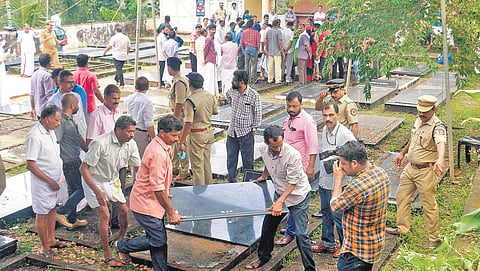‘Least chance of tracing cyanide in decomposed Koodathayi bodies’
KOZHIKODE: It is unlikely to trace the presence of cyanide in the remains of those who died years ago, said retired Forensic Surgeon Dr Sherly Vasu. “The expected thing is that cyanide presence could not be found in autopsy. But it would not adversely affect the case going by the strong evidence the police collected and the confession of the accused in the Koodathayi case,” Sherly told TNSE.
On Friday, the police collected samples of tooth, vertebra and hair from the six bodies and they were sent to Kannur Regional Forensic Laboratory for examination.
“Sodium Cyanide and Potassium Cyanide are a white crystalline alkaline salt which is highly unstable. It evaporates fast. A slight quantity, 250 gram, is needed to cause sudden death. The death is so sudden that it can happen within two minutes and if the given cyanide is obsolete, death can be delayed by 30 minutes,” Vasu elaborated.
After entering the body, cyanide acts with hydrochloric acid and gets converted into highly toxic Hydrogen Cyanide (HCN). Through plasma cells of blood, it soon affects the respiratory part and causes death. “Even if sudden death doesn’t occur, the affected cannot do anything like making a whimper or pressing a mobile number for help. The affected person will be struggling for breath,” she said.

